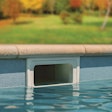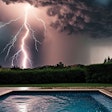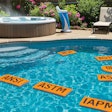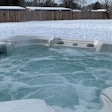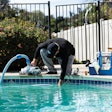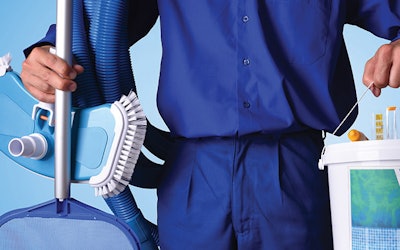
As with anything, there's an impressive learning curve when it comes to the pool and spa industry. There's the technical side, like learning the nuances of water chemistry and the equipment pad, but there's also a host of lessons you simply won't learn in a classroom.
That's where I come in. To better prepare up-and-coming service techs for the wild adventure that is pool service, I put together a list of just some things you'll come to learn on your route.

1. KEEP YOUR FINGERS OUT OF YOUR ORIFICES
On top of being, you know, nasty... putting your fingers in your eyes, ears, nose and mouth is a terrible idea for people who work in and around swimming pools and spas. You know how plumbers never chew on their fingernails? Pool pros should follow their lead. The best thing you can do for self preservation is to buy a lifetime supply of hand sanitizer and carry it with you 24/7.
2. NEVER PROMISE A DELIVERY TIME FOR PARTS
Every customer that has a problem with their pool asks the same question: "How long will it take to fix?" That's understandable — nobody wants to be without their pool on a hot and sunny weekend, or even worse, watch their pool turn green during equipment downtime.
In an effort to appease a stressed-out homeowner, pool pros often try to defuse the situation by promising their new part will arrive soon. Don't do it! It may seem like a good idea at the time, but when you make delivery promises, you assume all responsibility when the part doesn't arrive on time. Then you're stressed because the part isn't there and you know you're going to get chewed out by the homeowner, and they're even more stressed because their pool still isn't working.
An experienced pool tech knows you need to manage expectations by padding the expected delivery dates. If the product comes in "early," you get to surprise the homeowner with good news. So remember: underpromise, overdeliver.
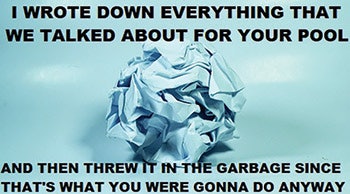
3. NEVER ASSUME YOUR INSTRUCTIONS WILL BE FOLLOWED.
Sometimes a pool owner needs to get involved with maintenance and chemical corrections; it's just not realistic (or a smart use of time) for you to make a trip to a pool every 12 hours to monitor its progress and adjust chemicals. In situations like this you have to leave very detailed instructions for the homeowner. Explain exactly what chemicals they need to add, the order in which they should be added and how much time they should wait between each step. Write it down for them, heck, even grab a permanent marker and write it on the chemical bottle directly.
RELATED: The 12 Kinds of Customers Every Service Tech Meets
But then, of course, you return and the pool is still a total disaster, and the customer is upset because they did "exactly what you told me to do" and it didn't work. Except they didn't do the multiple-stage correction that you explicitly spelled out for them...they had to go away for the weekend so they just dumped everything in all at once on Friday night. "Since this didn't fix the pool are you going to fix it for free now?"
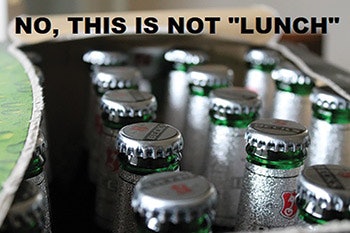
4. PACK A LUNCH
Service techs need to keep their energy going — you do a lot over the course of a day, and it's easy for a regular 8-hour day to turn into a 16-hour nightmare real quick. It's an absolute must to keep food nearby all the time. Pack a lunch, but don't stop there: Stock your truck with an emergency contingency of power bars or other nonperishable food. (And water, of course, unless you don't mind drinking out of a backyard hose.)
5. LOOK AWAY WHEN OPENING CHLORINE
Any pool technician who works with erosion feeders (or puck feeders) knows how incredibly important it is to turn your face away and close your eyes before twisting open a chlorinator. It's a good idea to hold your breath while doing this, as well. I typically close my eyes, face away from the chlorinator and, as soon as I crack the lid open, get up and vacate the area for a minute or two. Those extra steps aren't necessary most of the time, but every once in a while, I'm greeted by full-on chemical warfare — making me glad I played it safe.
Chlorine gas is nothing to be trifled with, and pretty much all of us have been gassed out before, which is how most of us learned to be wary of chlorinators.
Equally as important, or even more so perhaps, is to be wary when opening questionable buckets of chlorine...especially if the customer has provided the chlorine but "can't remember" how old it is.
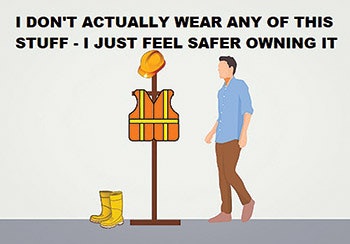
6. TAKE CARE OF YOUR BODY
When I started in the pool industry way back in what feels like 1907, I was told to be careful about hurting my back and knees. More specifically, I was told "nobody retires from the pool industry without a limp, cane or wheelchair." It's a joke that's funny because it's true: The work you do in this industry is incredibly hard on the body.
So get used to wearing personal protective equipment in your day-today life. Far, far, FAR too many people (especially the young guns) think they are too "cool" for safety equipment, or that they're young and invincible.
But remember: A single bad day on the job leave you in pain every day for the rest of your life. Or blind. Or dead. Be careful working on pools.
7. NEVER CARRY YOUR PHONE IN YOUR POCKET
If you're going to work on swimming pools you should probably get in the habit of leaving your expensive electronic equipment, like your phone, in the relative safety of the service truck. Pretty much everyone in this line of work eventually falls into a swimming pool (if not multiple times), and while it may be embarrassing, ruining an $800 phone in the process adds some serious insult to injury. Even if you manage to avoid falling into a pool with your phone in your pocket, all the bending, crouching, lifting and reaching you do while servicing pools can easily result in a cracked screen at the very least.
RELATED: Tips for Hiring and Training Service Techs
Cell phones are slowly evolving to include waterproof (or at least water-resistant) technology, and a phone like this is almost certainly worth the additional cost for someone who makes their living working around bodies of water. At the very least, investing in a rugged case like an OtterBox isn't a bad idea.
8. WATCH YOUR STEP IN THE BACKYARD
The moment I arrive at a new house I'm scanning the property for signs of dogs. Chewed-up shoes by the back door, scattered dog toys or a water bowl casually sitting outside are all signs to keep your head down...literally. There are few things that can make you hate a new client, and new pool, more quickly than stepping in dog crap. I would rather fall into a pool because I was looking at my feet than step into a fresh malamute steamer on my way to clean out a skimmer strainer basket.
9. CARRY EXTRA CLOTHES WITH YOU
I've noticed young people in the industry never seem to remember to bring an extra set of clothes, while the older guys always do. (Actually, keeping backup/emergency provisions of all kinds is something the younger generation could work on.)
When you work in this industry long enough you'll inevitably get stuck working in a torrential rainstorm, or as I mentioned earlier, fall in a pool and wind up soaking wet. Even getting your shoes and socks wet can put a damper (literally) on the day.
So keep a spare change of clothes, including socks and shoes if you have room, on the truck. Taking the time to stay as comfortable as possible at work is an experienced person's trick that the younger generation could benefit from learning.
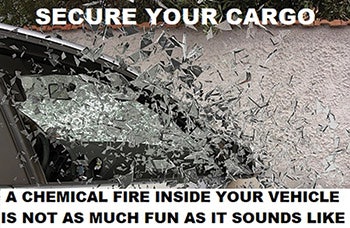
10. SECURE CARGO IN YOUR TRUCK
As you mature in your service career, it's easy to get complacent when loading and driving a truck. You can easily take for granted the dangerous nature of the tools and chemicals you carry with you every day. Even if you are the safest driver in the world, one day some idiot will cut you off in traffic, causing you to take evasive action. And if you did not secure the cargo in your vehicle, you could be in for a world of pain.
It's one thing to have a service pole, trash pump or jackhammer come sliding forward as you mash on the brakes, but having a bunch of chemicals tip over and mix together is even worse. If you have gasoline, chlorine, acid and who knows what else rolling around in the back of your truck, you could cause a chemical explosion or a fire. (And that could kill you, assuming the toxic fumes don't get you first.) Or imagine driving around with 20-foot lengths of rebar or pipe loosely tied on the roof racks of your truck and a pedestrian steps out in front of you...I shudder to think about it. Don't chance anything, and you won't have to think about it either.
11. CUSTOMERS ARE LIARS
Customers lie to pool and spa techs all the time. They'll tell you they backwashed the filter yesterday when it's really been three weeks. They'll say their pool is losing 6 inches of water per day...but is it really? Really??
Any time a customer tells me they are going to do something, like call on a specific day/time, leave the gate unlocked, remember to turn the water source on or PAY ME, I assume they are lying and put zero stock into them actually coming through as promised. That may sound pessimistic, but it helps me manage my (low) expectations. And on the incredibly rare occasions customers do follow through, it's a pleasant surprise.
12. YOU'LL SUDDENLY HAVE OLYMPIC-LEVEL HIGH-JUMP SKILLS
It's a little-known secret, but every pool tech has a superpower. It's one of those unique feats of human athleticism that can only be unlocked under situations of extreme duress...like a mother lifting a car off of her trapped baby.
There will come a day in the pool industry when you will be working hard in someone's backyard and will be confronted by a dog who is absolutely convinced that you are not supposed to be there. On this day you will find out you have rocket boosters growing out of your ass and you will effortlessly jump and hurdle 10-foot-tall fences.
RELATED: Lifehacks for Service Pros
I am not a physicist, but I think if you hit a fence at 100 miles per hour you only need about 1 percent upwards trajectory in order to have your momentum carry you up and over. It might not be graceful to look at, and there are no extra points for sticking the landing, but all pool pros can draw upon this athletic prowess when needed.

13. YOU'LL ALWAYS NEED THE PART YOU DON'T HAVE
One of the biggest challenges you'll face working on swimming pools is trying to foresee everything you will need for the day and ensuring you have those items with you. You can't bring your entire shop with you, so you do your best to anticipate what might come up and pack these extra items along.
But it always happens: You bring the parts you think you'll need, but the actual parts you need are the ones you don't have. This is normal. So normal, in fact, that I have a name for it: the "pool part enigma." Such is the life of a pool service worker and you must learn to accept that this is the way of the universe and there is nothing you can do to change it.

14. WEATHER REPORTS ARE NOT ACCURATE
Anyone who has ever planned a wedding or a concrete pour can attest to the fact that people who forecast the weather have no idea what they are talking about. Mostly cloudy, chance of rain, partly sunny…it's all so ambiguous! And sometimes it's just fl at-out wrong, like when they say there's a 0 percent chance of rain, but I find myself standing in the middle of a thunderstorm. Where is the accountability? I am not allowed to be that wrong in my job, why are they!?
Once you've been in the industry long enough, though, you'll be able to gauge oncoming weather by just the look of the sky and the feel of the wind. Really experienced service techs can even predict rain the night before because the pain from their arthritis keeps them up all night!
15. WEAR GLOVES AND LONG SLEEVES WHEN CLEANING FILTERS
Have you ever noticed that your arms get covered in bumps any time that you change out the sand from inside a sand filter? Or what about cleaning the elements on a cartridge or D.E. filter? That reaction is due to the disgustingly high level of bacteria found in those settings. If you really stop to think about it, which you probably shouldn't, pool filters are absofrigginglutely disgusting. Their job is to capture all of the sweat, oils, bird crap and whatever else ends up in the pool. These magical ingredients then percolate inside in the filter for weeks, months or years, until the day you stuff your bare arm in there and start scooping it out like you're looking for a prize at the bottom of a cereal box. Out of respect for yourself and your loved ones whom you presumably touch with your gross hands and bumpy arms, wear some gloves and some long sleeves when dealing with pool filters.
All jokes aside, this is only a small sample of the frustrating and challenging things you'll encounter while working on pools. Have any suggestions for lessons I should add to the list? Email me your thoughts and they might be included in a follow-up story.
Steve Goodale is a second-generation swimming pool expert located in Ontario, Canada. You can learn more about Steve, as well as swimming pool construction, maintenance and repair, from his website: SwimmingPoolSteve.com. He can be reached at [email protected].






























